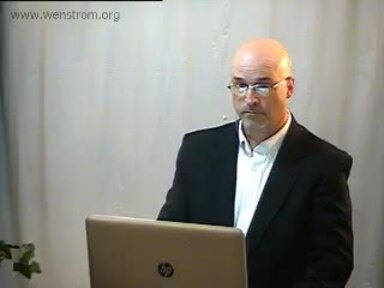Church Series-Peter's Teaching in First Peter 4.10-11 Regarding Spiritual Gifts
Wenstrom Bible Ministries
Pastor-Teacher Bill Wenstrom
Wednesday November 16, 2016
The Church Series: Peter’s Teaching in First Peter 4:10-11 Regarding Spiritual Gifts
Lesson # 16
The apostle Peter teaches in 1 Peter 4:10 that each and every believer in the church age has received only one spiritual gift at the moment of their conversion.
This gift he teaches is to be employed by the believer in serving their fellow members of the body of Christ.
1 Peter 4:10 As each one has received a special gift, employ it in serving one another as good stewards of the manifold grace of God. (NASB95)
Principles from 1 Peter 4:10:
(1) The word “gift” is the Greek word, charisma, which means “a gift of grace, a free gift.”
It is especially used of special spiritual abilities given by the Spirit for God to enable Christians to serve the body of Christ.
(2) All believers have one spiritual gift.
At the point of justification, when we believe in Jesus Christ as Savior, we become members of the body of Christ by the baptizing work of the Holy Spirit who places us into union with Christ.
According to the analogy portrayed in 1 Corinthians 12:12-27, each believer becomes a gifted member, like an arm, or a foot, or an eye with ability and a function to perform.
This is a matter of grace and the sovereign work and choice of the Spirit, never our merit or works (1 Cor. 12:4, 11, 18).
(3) Our gifts are to be viewed as a stewardship for which we are responsible as “good (Greek: kalos, noble, praiseworthy, useful) stewards.”
(4) Peter also teaches us gifts are given for “serving one another.”
They are for the common good of the body of Christ as an expression of love (1 Cor. 13) and never for personal gain or selfish agendas (1 Cor. 12-14).
The apostle Paul defines the common good by such things as edification (building up the body of Christ), exhortation, consolation, and instruction, attaining unto a mature man in Christ, etc. (1 Cor. 12:7; 14:3-5, 17, 19, 26, 31; Ephesians 4:11-16).
1 Peter 4:11 Whoever speaks, is to do so as one who is speaking the utterances of God; whoever serves is to do so as one who is serving by the strength, which God supplies; so that in all things God may be glorified through Jesus Christ, to whom belongs the glory and dominion forever and ever. Amen. (NASB95)
Principles from 1 Peter 4:11:
(1) For those who serve in other ways, Peter teaches that they must do so by the strength, which God richly supplies, rather than in their own strength (see 1 Cor. 15:10; Col. 1:29).
All stewards need to be serving out of the source and sphere of fellowship with God and dependence on Him (John 15).
(2) With the words, “to whom belongs the glory and dominion, …” Peter reminds us that no matter what is done, the purpose or ultimate goal is God’s glory and dominion (rule) through the Lord Jesus.
This forms a fundamental principle and a warning that should guide the whole of the Christian’s life and ministry as a steward of the various aspects of God’s grace.
Due to our innate self-centered tendencies, it is far too easy to serve from selfish agendas—to be accepted by others, or for praise, position, or prestige.
This was one of the problems that Paul addressed with the church at Corinth.
Some of the Corinthians were using their gifts, especially the more spectacular or showy gifts like tongues, for personal gain.
Paul said, “One who speaks in a tongue edifies himself; …” (1 Cor. 14:4a).
In other words, they were using this gift for selfish purposes.
Though the one who speaks in a tongue does not understand what he is saying (vs. 14), they are still edified personally by the emotion and satisfaction of the experience.
Clearly, his primary motive is not according to the excellent way of love for others (1 Cor. 12:31b-13:13; 14:4b, 12) and, therefore, it cannot truly be designed to glorify God (1 Cor. 10:31).
For the proper functioning of spiritual gifts, we must cease thinking individualistically and begin to think corporately.
We cannot look at ourselves as an island, independent of all others.
We must see ourselves as a member of the body of Christ, with certain gifts or special enablements which equip us to carry out functions necessary to the equipping and ministry of the body.
There is individuality within the body, because there are many members, all with a different role to play.
But there is no room for individualism, for we are inter-dependent as members of one body.
We must rely on other members of the body just as they must rely on us.
While we have been individually chosen, called, and justified, we have been joined to a body, the body of Christ.
We must therefore think and act as members of this body.
Spiritual gifts are one of the means by which the body of Christ is sustained and through which the life of our Lord is manifested.
Thinking straight necessitates thinking corporately.
Hindrances to good stewardship of our gifts:
(1) The belief God only calls preachers, evangelists, missionaries, etc.
(2) Fear that we will fail, we will be persecuted, or that we don’t know how.
(3) Personal agendas in ministry for various reasons of covetousness—position, power, praise, applause.
(4) Apathy, lack of devotion to the Lord and the body of Christ.
(5) A wrong view of the church as an organization rather than an organism.

